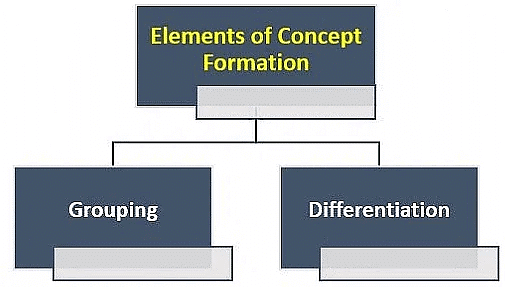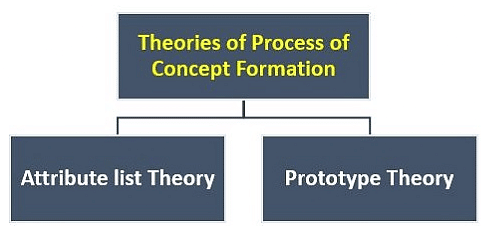Concept Formation Processes | Psychology for UPSC Optional (Notes) PDF Download
| Table of contents |

|
| Introduction |

|
| What is Concept Formation? |

|
| Lev Vygotsky's Contribution |

|
| Elements of Concept Formation |

|
| Process of Concept Formation |

|
| Concept Formation and Structures |

|
| Conclusion |

|
Introduction
Concepts represent an individual's perception or understanding of reality. When trying to explain people's actions and predict their future behavior, everyday reasoning often relies on concepts. Concepts can be abstract (e.g., air) or physical, like a balloon. One important aspect of concepts is that they serve as the basis for behavior, rather than directly representing reality itself. Concepts require both abstraction and generalization, as they isolate specific traits while acknowledging that these traits can be attributed to different things.
What is Concept Formation?
Concept formation is a higher-order mental process that operates on information processed and stored in memory after being perceived by our senses. This process involves categorizing the information conceptually and applying that knowledge to tasks such as planning, goal-setting, problem-solving, and reasoning. Depending on the demands of a task, these categories are retrieved from long-term memory. It is believed that the processing of such information involves neural pathways connecting the temporal cortex to the visual cortex. Developing concepts and knowledge greatly facilitates understanding task requirements and achieving goals. Infants and young children, for example, develop concepts about objects, people, and actions through categorization. Infants learn to classify faces as familiar or unfamiliar at an early stage of their development.
Lev Vygotsky's Contribution
Vygotsky (1997) established a direct connection between concept formation and volition with his double stimulation theory. The development of future-oriented thought and the ability to take volitional action are closely intertwined in collaborative activities. The formation of concepts related to perspectives that are future-focused or possibility-oriented suggests a significant, yet unexplored, relationship between concept formation and volition. Volition can be understood as the ability to generate and carry out intentions that go beyond and transform the normative practices and predetermined circumstances of an activity in which individuals are engaged.
Elements of Concept Formation
Major elements of concept of formation are
 The processes of grouping and differentiation play crucial roles in the formation of concepts. They can be defined as follows:
The processes of grouping and differentiation play crucial roles in the formation of concepts. They can be defined as follows:
- Grouping involves organizing information into larger chunks or groups. By focusing on these groups instead of individual items, the cognitive system becomes more efficient. Grouping reduces the attentional demands of a task, allowing individuals to allocate their attention to other important stimuli.
- On the other hand, differentiation refers to the process of perceiving more detailed information from various stimuli as one becomes more familiar with them.
Process of Concept Formation
When two individuals meet for the first time, it presents an opportunity for them to form initial impressions and judgments about each other. In this situation, the observer undergoes a process of concept formation. There are two contrasting cognitive theories regarding concept formation.

Attribute List Theory
The Attribute List Theory suggests that concepts are stored in semantic memory, which is responsible for language usage, based on their symbolic characteristics or attributes. When encountering something new, like a mobile phone, individuals try to categorize it by comparing its features with previously held ideas or existing phones that share common characteristics. This classification process involves comparing the features of the stimulus with those of other concepts stored in semantic memory. The majority of applications of the multi-attribute attitude paradigm implicitly rely on this concept structure model.
Prototype Theory
- Rosch (1975) proposes an alternative paradigm called Prototype Theory, which suggests that concepts are remembered based on their "most typical" or prototypical examples. Research shows that people are quickest to recognize inputs that resemble the prototype of a concept. The discussion of internalized product prototypes by Rosch is rooted in Bartlett's early studies on memory schemata. Simply put, a schema is an abstract representation of concepts consisting of a fundamental set of details that capture the essence or gist of the stimuli.
- Experimental findings suggest that during learning, individuals acquire knowledge not only about the prototype stimulus but also about the variability among instances of a particular category. They learn to identify the best instance of the category and understand the permissible variability or distance between acceptable stimuli. For example, a Ford Fairmont sedan may closely resemble the prototype of the concept "automobile" because it shares its attributes with that category of products.
Concept Formation and Structures
- Human knowledge is conceptual and exists as a whole. When describing human knowledge, two factors must be considered: context and hierarchy. These concepts have significant implications for concept generation and organizational structure. The context in which concepts are generated provides meaningful interpretations. The theoretical view of concepts aims to capture the contextual aspect to a great extent. It is believed that one's theory of a domain influences the production of individual concepts as well as the broader conceptual structure. Theory and sophisticated knowledge structures play a vital role in concept formation, combination, and learning.
- Human knowledge is organized in a hierarchical manner or tower-like structure. The fundamental concepts form the foundation or minimum elements of the hierarchy, while higher-level concepts rely on lower-level ones. The first-level concept is derived directly from perceptual data. Higher-level concepts represent a more advanced state of knowledge and are created through an abstraction-from-abstractions process. Concept formation faces two primary challenges: aggregation and characterization.
- Aggregation involves identifying a collection of items to form an extension of a concept. Characterization aims to define the intended meaning of the derived collection of objects. Two fundamental processes are considered for aggregation: differentiation, which helps understand distinctions between items, and integration, which involves combining pieces to form a cohesive whole. Characterization, as the final stage of concept development, provides a definition for a concept.
Conclusion
Some cognitive researchers propose the possibility of finding common ground between the opposing paradigms of prototype theory and attribute list theory of concept formation. They suggest that by replacing the idea of concept representation through attribute lists with a model based on attribute frequency, the two perspectives can be reconciled. For instance, an individual's ability to accurately categorize and evaluate a novel automobile is influenced by the frequency and pattern of attribute overlap with the prototype concept of an "automobile" that the person has in mind. Thus, a theoretical compromise position can be achieved by combining ideas from the attribute list and prototype paradigms of concept formation.
|
165 videos|215 docs
|















